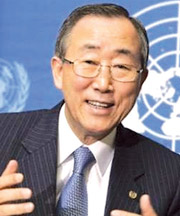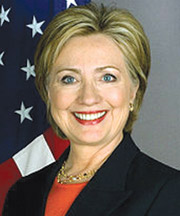NAM and changing global power relations
 East
Asia, which is currently the scene to a multiplicity of regional
tensions, besides being an arena of unprecedented economic dynamism and
productivity, is also part of what is considered the ‘energy demand
heartland’ of the world. That is, the region has an abundance of oil and
gas deposits which many a major power may be seeking to exercise control
over. East
Asia, which is currently the scene to a multiplicity of regional
tensions, besides being an arena of unprecedented economic dynamism and
productivity, is also part of what is considered the ‘energy demand
heartland’ of the world. That is, the region has an abundance of oil and
gas deposits which many a major power may be seeking to exercise control
over.
As this commentary is being written, we are informed that US
Secretary of State Hillary Clinton would be in the Cook Islands as part
of a tour to bolster the presence of the US in the Asia-Pacific region.
The development comes against a backdrop of simmering territorial
disputes featuring China and a number of other regional heavyweights,
over the Spratley Islands and other territories in the South China Sea,
and Japan and Korea over control of the East Sea. On top of all this
comes a squabble between China and Japan, with some islands at its
centre. All these and more disputes point to concerns among these key
international actors over perceived untapped energy resources in East
Asia.
|

Ban Ki-Moon |
Many of the states mentioned are dynamic industrial powers which are
badly in need of energy resources to sustain their economic growth.
Their economic futures depend very crucially on the power and energy
base they could have control over and this is a trigger factor to many
of their territorial squabbles.
Economic power
However, this rash of territorial disputes accompanies a shift in the
global economic power balance from the West to East Asia and with the
emergence of the Asian region as the economic epicenter of the world.
For instance, the Free Trade Area between China and ASEAN, for instance,
boasts of an economic productivity that easily dwarfs the economic might
of the West and showcases a consumer base which is of enormous and
phenomenal proportions.
Accordingly, things could not be more promising for the developing
world as the Non-aligned Movement meets on August 30 at Heads of State
level for its 16th Summit in Tehran. The developing countries meeting
within the fold of NAM would do well to put up an unbreakable united
front to consolidate their power in the current world power structure
which until now was weighted, of course, towards the West.
The current changes in the international power system need to be
seized by the developing countries to restructure the prevailing
economic order in more equitable directions so that their decades-long
material grievances could finally be rectified. In order to do this they
would need to contain rifts and disputes among themselves, which have
been stalling their efforts at securing collective economic and material
gains over the years.
Political leaders
Well, the slogan, a New International Economic Order, may not ring a
bell for the younger generation of world political leaders but it needs
to be remembered that this was a rallying cry of the Third World in the
decades of the Sixties and the Seventies. That was the heyday of OPEC
and of the promise raised by the oil wealth garnered by these oil and
energy resources rich countries. The hope was that the oil rich
countries would use their clout to share some of their gains with the
Third World but this did not materialize fully.
|

Hillary Clinton |
One hopes that with the international economic power balance now
decisively shifting to East Asia, the consideration that economic
justice should be meted out to the developing countries, would enjoy a
fresh lease of life.
This issue needs to be taken-up by NAM and the structures put in
place to eventually generate economic justice for the ‘Wretched of the
Earth.’ The economically better off countries of the Eastern hemisphere
would need to think beyond their immediate interests to make this happen
even by and by.
But it augurs well for NAM that UN chief Ban Ki-Moon is considering
it advisable to attend the NAM Summit in Tehran, disregarding Western
protests in the process. It indicates that the UN is attaching great
importance to the changing global economic power structure. The UN
chief’s gesture should read as implicit support for the cause of NAM,
and the lesser powers of the world should make full use of this huge
plus. |





